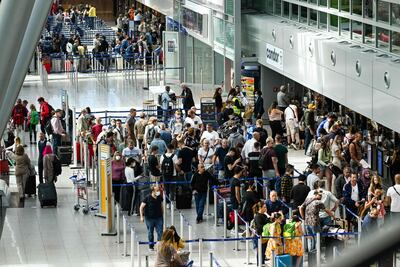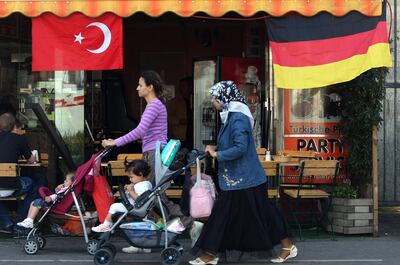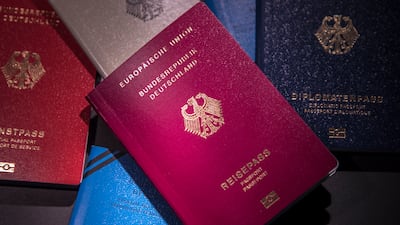Migrants in Germany could get citizenship in only three years under reforms announced on Wednesday that could benefit Turks and Syrians.
The quick route to a passport is being offered as Germany looks for workers to plug labour shortages.
The usual waiting period for citizenship will be cut from eight years’ residency in Germany to five.
Migrants who speak particularly good German or excel in work or volunteering will be eligible after three years.
Children born in Germany will be eligible for citizenship if at least one parent has lived there legally for five years.
Dual nationality will no longer be frowned upon – a change that experts predict will encourage Turkish people to take up German passports.
Older people who moved to Germany as guest workers during the Cold War, many of whom were Turkish, will no longer face a citizenship test.
People who live on benefits or are convicted of racist or anti-Semitic crimes will not be eligible.

“We will only attract the world’s best talent if they can become well and truly part of our society, with full democratic rights, within a foreseeable period,” German Interior Minister Nancy Faeser said in Berlin.
The shake-up by Chancellor Olaf Scholz’s government comes after separate reforms in June that offered visas to IT specialists, skilled workers and certain asylum seekers.
With an ageing population, Germany needs an estimated 400,000 migrants per year to fill staff shortages in hospitals, social care, schools, kindergartens and the IT sector.
Passport demand
More than 48,000 Syrians were naturalised as Germans last year when many of the refugees who arrived in 2015 and 2016 became eligible.
People of Syrian origin made up more than a quarter of new German citizens in 2022. Many took the fast-track route that is now being cut to three years.
The three-year path will be open to those who speak German at C1 level – meaning advanced proficiency on an international scale – or are particularly impressive in jobs, schools or civil society.
Most people will have to take a citizenship test, as well as pledging loyalty to Germany’s democratic order and showing they can support themselves and their families. People on benefits will generally not be eligible.
“We need immigration into the labour market, not into social security systems,” said Justice Minister Marco Buschmann.
Applicants will be barred if they reject the principle of equality between men and women or are convicted of any racist or anti-Semitic offence, however small the penalty. They will also face security checks.
Children born in Germany to foreign parents can keep both passports if one parent has lived there for five years – down from eight – and will not be asked to choose between two nationalities.
Germany has previously restricted dual nationality to limited cases, but the rules are being relaxed under what integration chief Reem Alabali-Radovan called a “modern citizenship law”.
“Many people who want to be nationalised feel deeply connected both to Germany and to the country where they or their parents were born,” she said.
“In future they will no longer have to give up their previous nationality, and thereby a part of their identity, in order to obtain a German passport.”
Guest worker generation
Rules are being relaxed for the “guest worker generation” who arrived in Germany between the 1950s and 1980s, many of whom are now retired.
About 850,000 people moved to West Germany from Turkey under a guest worker scheme. A similar programme existed in East Germany for workers from communist states.
Guest workers who now want to become German citizens will not face the citizenship test, and have to show only conversational language skills. They are also exempt from the no-benefits rule.
“We want to honour the enormous contribution of the guest worker generation to our country,” Ms Faeser said.

About 12 million people living in the country do not have German citizenship, Ms Faeser said. An estimated 5.3 million have lived there for at least 10 years.
Speaking in March, one immigration official, Peter Schlotzer, said many Turks had “so far shied away from applying” because they wanted to keep their original citizenship.
“Dual nationality will certainly lead to many applications being made; from what I’ve heard, especially from the Turkish community,” he said.
The opposition Christian Democrats said the proposed five-year norm was “too short”. Home affairs spokesman Alexander Throm said there was a “great risk that people are naturalised here who are not sufficiently integrated”.


